Online Course Catalog

Navigating Special Dietary Needs (ISBE-512)
CACFP sponsors may need to modify planned meals in order to accommodate participants with disabilities, medical needs or special dietary needs. The course summarizes the responsibilities sponsors have when accommodating participants’ meal requests. The course also discusses medical statements, meal pattern requirements, and accommodating non-disabling special dietary needs.
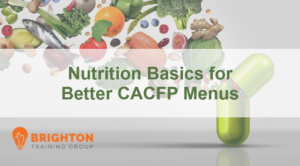
Nutrition Basics for Better CACFP Menu Planning (ISBE-502)
Once you have the CACFP meal pattern compliance mastered, the next step in planning CACFP meals is making sure you cover all the basic nutrition needs. In this one hour session, participants will learn the importance of where the CACFP meal pattern comes from and how to incorporate basic nutrition into CACFP menu planning mastery.
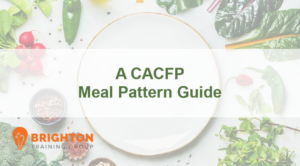
A CACFP Meal Pattern Guide (ISBE-505)
One of the hardest parts of planning a CACFP menu is understanding if a food is creditable or not and how much you need to serve. In this brief overview, participants will learn about tools to guide them to determine if a food is creditable to the CACFP meal pattern, and how much they need to serve to be in compliance.
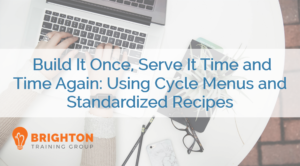
Build It Once; Serve It Time and Time Again: Using Cycle Menus and Standardized Recipes (ISBE-504)
How important is menu planning to a meal program? The menu plan influences every aspect of the meal program – including purchasing and preparing foods, ensuring that your meals are CACFP creditable, providing adequate nutritional value, accounting for dietary restrictions, and satisfying the tastebuds of the children in your care. In this one hour session, participants will learn about standardized recipes, cycle menus and the benefits of using both of these great tools to maximize kitchen efficiency and food budgets.

Menu Building Basics: Utilizing CN Labels and USDA Recipes to Build a Cycle Menu (ISBE-522)
In this course, participants will learn to recognize the 6 key indicators for a CN Label is, what a product formulation statement is, and how to use them to build a cycle menu. In addition, participants will explore the vast resources of USDA Standardized recipes, and will learn how to scale these recipes and products to fit their production needs. Lastly, participants will understand the basics of record retention and what documentation would be needed to support food production records, if required by their state.
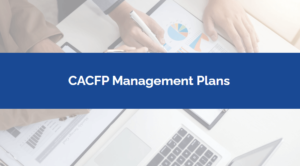
Management Plans (CORE-840)
This course will discuss the definition, purpose and components of a management plan. Participants will learn how to evaluate, monitor, revise and submit the management plan. Participants will also discuss the CACFP performance standard and share best practices.
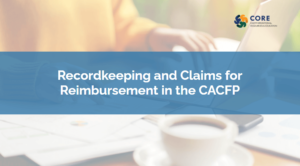
Recordkeeping and Claims for Reimbursement in the CACFP (CORE-830)
This course will review CACFP recordkeeping requirements and explain how maintaining records relate to the submission of an accurate claim for reimbursement. Participants will identify common CACFP records and discuss frequent issues associated with recordkeeping and management practices that adversely impact claims for reimbursement. Participants will learn the CACFP edit check requirements and discuss best practices for submission of a claim for reimbursement.
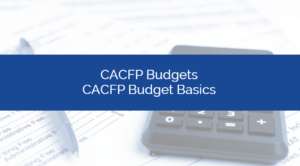
CACFP Budgets (CORE-870)
This course will discuss the importance of the CACFP budget and how it relates to the management plan and the CACFP performance standards. Participants will obtain an overview of the federal cost principles and how they relate to the CACFP budget. Participants will also learn the key steps for creating a CACFP budget and receive best practices for developing and monitoring a CACFP budget.
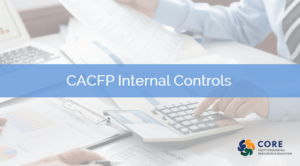
Internal Controls (CORE-850)
In this course, participants will learn the purposes, components and principles of internal controls. Participants will demonstrate how to document, assess and monitor internal controls as well as identify common program areas where internal controls are essential.
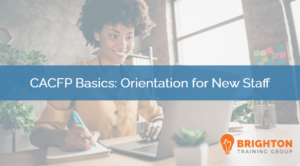
CACFP Basics: Orientation for New Staff (ISBE-557)
Do you wonder how CACFP benefits the participants in your organization? Are you unfamiliar with the goal of CACFP? Are you wondering what CACFP even means? Then this is the course for you! Over the next hour, we will dig into the basics of the Child and Adult Care Food Program and how it supports children and adults each and every day.
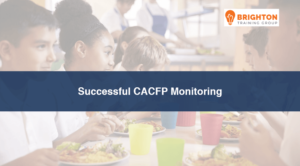
Successful Monitoring (ISBE-585)
This course will give CACFP sponsor monitors an outline of their responsibilities for conducting successful reviews of centers or family day care homes. They will better understand the requirements for reviews and how to assess compliance with USDA regulations. Finally, they will be able to recognize problems that would result in review findings.
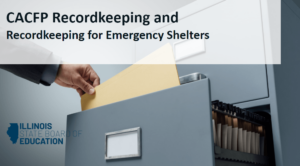
General Recordkeeping and Recordkeeping for Emergency Shelters (ISBE-614)
This course focuses on general CACFP recordkeeping requirements in lesson 1. In lesson 2, recordkeeping requirements for Outside School Hours Care Centers is discussed more specifically. The course addresses program eligibility, operational requirements, enrollment, participant eligibility, and miscellaneous recordkeeping requirements.
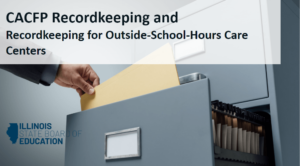
General Recordkeeping and Outside-School-Hours Care Centers Recordkeeping (ISBE-613)
This course focuses on general CACFP recordkeeping requirements in lesson 1. In lesson 2, recordkeeping requirements for Outside School Hours Care Centers is discussed more specifically. The course addresses program eligibility, operational requirements, enrollment, participant eligibility, and miscellaneous recordkeeping requirements.

Crediting Foods in CACFP (ISBE-605)
This course goes into detail on crediting foods in the CACFP. The course discusses Child Nutrition labels, Product Formulation Statements, and standardized recipes.
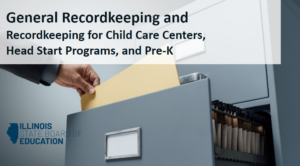
General Recordkeeping and Child Care Centers and Head Start Recordkeeping (ISBE-611)
This course focuses on general CACFP recordkeeping requirements in lesson 1. In lesson 2 recordkeeping for Child Care Centers and Head Start programs will be discussed. The course addresses program eligibility, operational requirements, enrollment, participant eligibility, and miscellaneous recordkeeping requirements.
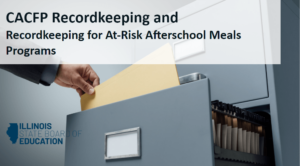
General Recordkeeping and At-Risk Afterschool Meals Program Recordkeeping (ISBE-612)
This course focuses on general CACFP recordkeeping requirements in lesson 1. In lesson 2, recordkeeping for At-Risk Afterschool Meals Programs is discussed more specifically. The course addresses program eligibility, operational requirements, enrollment, participant eligibility, and miscellaneous recordkeeping requirements.
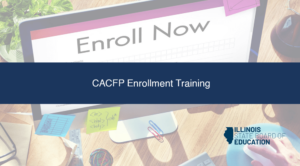
CACFP Enrollment (ISBE-602)
This course covers the enrollment process for applicable programs, completed Enrollment Forms, and annual update requirements.
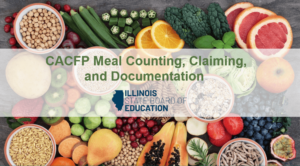
Meal Counting, Claiming and Documentation (ISBE-604)
Submitting a claim for CACFP reimbursement requires detailed recordkeeping and preparation prior to the submission. This course reviews requirements related to point of service meal counts, attendance documentation, the edit check process, consolidation, and claim submission.
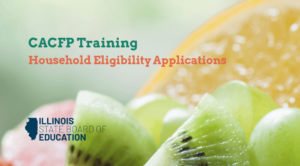
Eligibility Determination (ISBE-601)
Income Eligibility Forms (IEFs) or Income Eligibility Applications (IEAs) are required to determine the free, reduced-price, and paid eligibility categories for CACFP participants. This course reviews IEF/IEA requirements, demonstrates determining income eligibility, and discusses annual update requirements.

